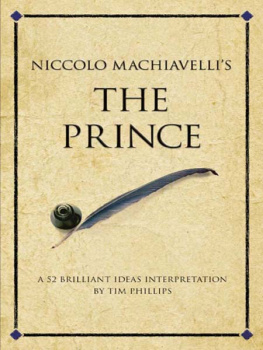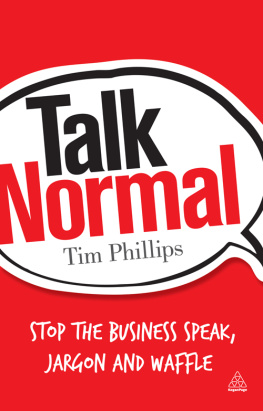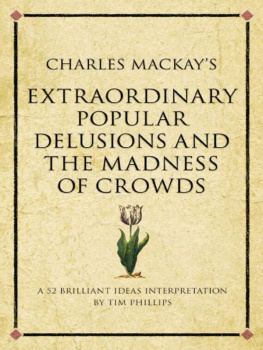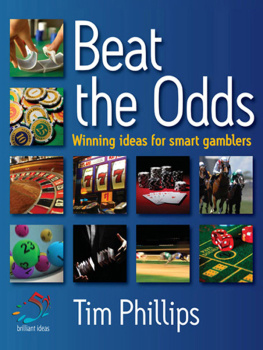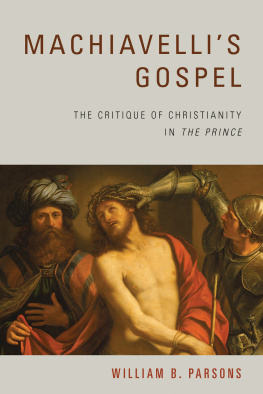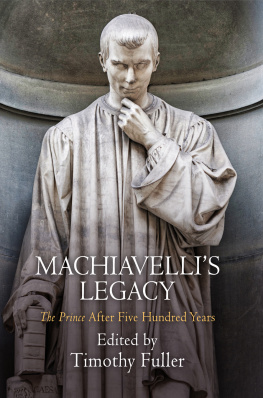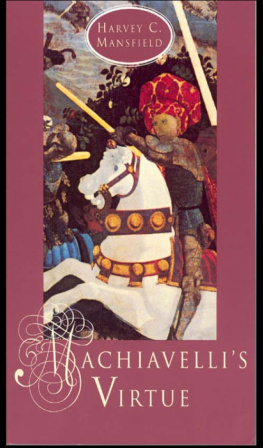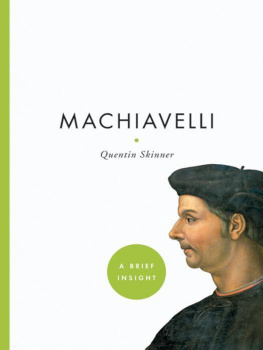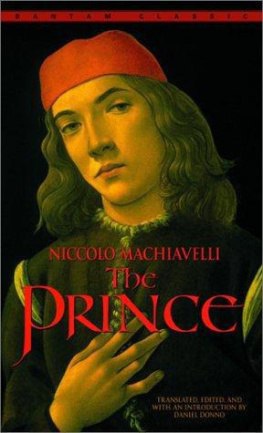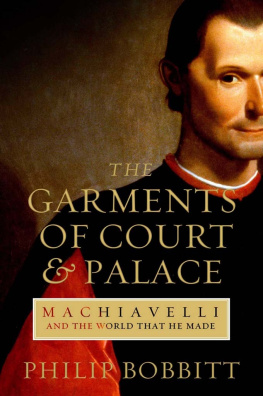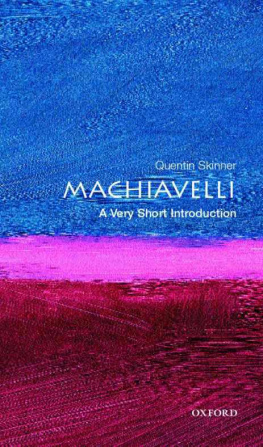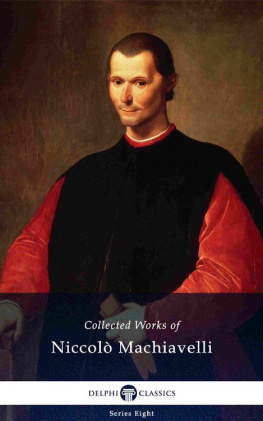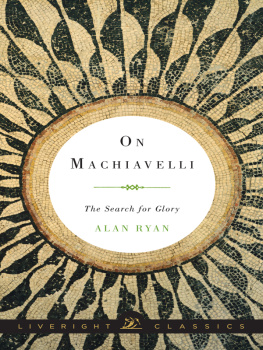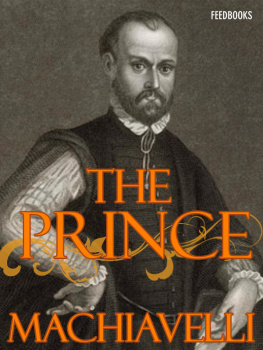
Niccolo Machiavellis
THE
PRINCE

Copyright Infinite Ideas Limited, 2008
The right of Tim Phillips to be identified as the author of this book has been
asserted in accordance with the Copyright, Designs and Patents Act 1988.
First published in 2008 by
Infinite Ideas Limited
36 St Giles
Oxford
OX1 3LD
United Kingdom
www.infideas.com
All rights reserved. Except for the quotation of small passages for the purposes of criticism or review, no part of this publication may be reproduced, stored in a retrieval system or transmitted in any form or by any means, electronic, mechanical, photocopying, recording, scanning or otherwise, except under the terms of the Copyright, Designs and Patents Act 1988 or under the terms of a licence issued by the Copyright Licensing Agency Ltd, 90 Tottenham Court Road, London W1T 4LP, UK, without the permission in writing of the publisher. Requests to the publisher should be addressed to the Permissions Department, Infinite Ideas Limited, 36 St Giles, Oxford, OX1 3LD, UK, or faxed to +44 (0)1865 514777.
A CIP catalogue record for this book is available from the British Library
ISBN 9781904902836
Brand and product names are trademarks or registered trademarks of their respective owners.
Designed and typeset by Cylinder
Printed in India
BRILLIANT IDEAS

Written in 1513 when he was out of a job and exiled on the family farm ten miles outside Florence, The Prince is the book that brought Machiavelli fame and created his reputation as the father of modern political thought but, ironically for a man who insisted on doing everything for a good reason, it didnt land him the job in Florentine politics that he craved. This concise combination of CV and how-to guide reads like a modern self-help book. Trouble is, theres not a big market for self-help books for princes.
So its useful that its direct and often hilariously amoral advice, delivered in plain language, is an excellent guide to getting ahead at work. That is, if youve got the guts to take the advice. Today Machiavellian is how we describe someone who lies and cheats simply to gain and hold on to power. Its true that The Prince is all about getting and keeping power; its also true that Machiavelli, as we will see, had some ideas about how this should be done that sideline conventional morality. But if we dismiss him as some sort of Renaissance gangster, were a long way wide of the mark.
His reputation hasnt been helped by his fans throughout history. Frederick the Great, Louis XIV, Napoleon, Bismarck and Hitler all kept copies handy Napoleon, in particular, thought a lot about Machiavellis ideas. Many people have condemned the book as a manual for tyrants, and its true that you can see echoes of Stalin, Mao Tse Tung and every one of historys bad guys. But there are reasons for this. Machiavelli was responding to the world as it was: he wanted his princes to have power because power brought stability. Italy was a mishmash of city-states which were vulnerable to attack, and Machiavelli had lost his job the previous year for fifteen years he had been an influential figure in international relations when the Florentine Republic capitulated to the Medici family and its powerful backers. With republicanism almost extinguished in Italy, Machiavelli concerned himself not with the abstract rights or wrongs of competing forms of government, but with how Italys rulers could bring stability and success to his homeland.
His other books (at this point Im saving you the trouble of reading the Discourses on Livy) suggest that by nature he was a fan of republican government. He was no friend of dictators but he reasoned that if dictators were all the Italians had, then it was better that they had dictators who were good at their job. He was also a very practical man, who had spent his working life engaged in face-to-face diplomacy with the most powerful men in Europe. He had seen what had worked and what didnt (and he wasnt shy about naming names in The Prince). He also knew how the minds of Italys enemies worked, the ruthless desire for power among Europes leaders (and in the Catholic Church at the time). He knew that ethics and fine words wouldnt get you very far against people like these.
Finally, he wanted to work. He dedicates the book, which wasnt commercially published in his lifetime, to Giuliano deMedici who was due to take over in Florence. After Giuliano died, he amended the dedication to Lorenzo deMedici, his successor. The Medicis, we can safely say, appreciated the importance of power. In the 500 years since Machiavelli died his ideas have been taken up by outsiders, and even though most people dont like to admit it copied by them. Deep inside, few of us believe we can achieve power and influence by talent alone. Concepts like office politics or public relations are properly Machiavellian. Its impossible to adapt Machiavellis thinking wholesale to the modern world. He wasnt writing about twenty-first century Western Europe. But he would have probably recognised the world of global business, hostile takeovers and international finance. His Prince is closer in nature to a modern CEO than to a prime minister. You dont have to swallow Machiavellis ideas whole; hes not prescribing a way for all of us to live, hes saying that if you want to lead, you need power; and if you want power, this is what you have to do to hold on to it. A century after his death, one of the first British modern political thinkers got the idea. We are much beholden to Machiavel and others, that write what men do, and not what they ought to do, wrote Francis Bacon in 1605. And 350 years later, a truly modern political thinker reflected the thinking behind The Prince perfectly in his speeches. The only thing that power respects is power, he said. Much of what I say might sound like its stirring up trouble. But its the truth. You cant deny that. You may not like my saying it, but you cant deny it. If youre afraid to tell the truth, why you dont even deserve freedom.
That was Malcolm X. See, Machiavelli is a magnet for controversy. Are you tough enough to listen to what he has to say?
DEFINING IDEA
Nothing says Obey Me like a bloody head on a fence post!
~ STEWIE, FAMILY GUY
Preparation isnt about hoping for the best: its about having a strategy to cope with the worst, whatever that takes.
Cruel, treacherous and irreligious deeds increase the prestige of a new master of a country in which humanity, trustworthiness and religion have long ceased to have any force, Machiavelli wrote in a letter in 1506, seven years before he started writing The Prince. This shows that he didnt come up with the ideas for his book in a moment. When he was a working politician, they were already in his head.
Now, a word about why were here. We encourage others to be nice. We tell others what great people they are, and they tell us were fantastic. Who are we kidding? Machiavelli tells it like it is: if you want to get ahead, goodness will only get you so far.
Today were obsessed with being good. There are books on the power of niceness and hundreds of articles telling us that in business, nice guys dont finish last after all. But its mostly bullshit. Its good to be good, but if people arent going to be good right back, youre usually stuffed. You can inspire goodness in others, but if you have employees, shareholders and customers demanding instant performance, you sometimes dont have the time to wait for them to be inspired to be good too and you cant afford to take the risk that they wont listen.
Next page
